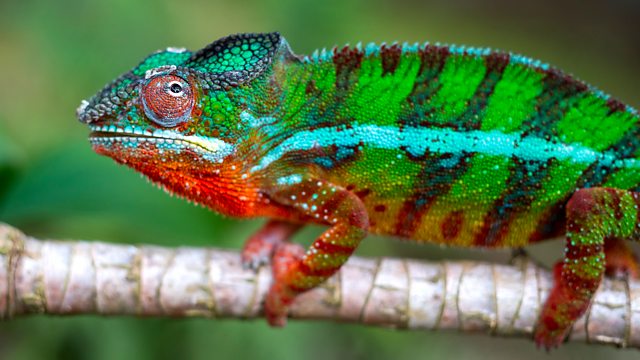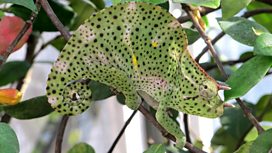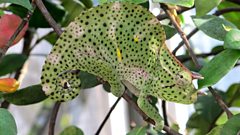Chameleon
Brett Westwood spots a chameleon and investigates how this master of disguise has led us to ask big questions about how we adapt to the environments we find ourselves in. From 2016
Brett Westwood spots a chameleon and investigates how this master of disguise has led us to ask big questions about how we adapt to the environments we find ourselves in. John Keats coined the term "the camelion poet" to describe a curiosity to explore situations and settings outside of usual experience, which may be at odds with expected morals and personality. He argued that to be chameleon was to take on poetic guises separate from the self. Meanwhile Shakespeare was said to embody his characters to the extent that it was hard to know his own personality. David Bowie was described as a "musical chameleon" but was frustrated at the description, while the poet Jack Mapanje embraced the chameleon's ability to camouflage itself and used it as a way of voicing his political views under a cloak of ambiguity in his collection 'Of Chameleons and Gods'. Brett talks to reptile expert Rob Pilley, poet Jack Mapanje, English lecturer Stacey McDowell, sociologist Eoin Devereux and folklore expert Marty Crump.
First broadcast in a longer form : 11th October 2016
Original Producer: Tom Bonnett
Archive Producer : Andrew Dawes for Â鶹ԼÅÄ Audio in Bristol
Last on
![]()
Here are some incredible things you might not know about the masters of disguise.
Clip
-
![]()
Spot the difference: see how quickly this chameleon changes
Duration: 00:36
Professor Marty Crump

From creation myths to trickster tales, Marty reveals both our respect and fear of amphibians and reptiles in her book:Ìý.
Professor Eoin Devereux

He is also the co-editor ofÌý.ÌýHe co-organised the first ever symposium on David Bowie in October 2012. In what remains of his spare time, he gardens, plays bass guitar, DJ's and writes short fiction.
°Õ·É¾±³Ù³Ù±ð°ù:ÌýÌý
Dr Jack Mapanje

He was imprisoned without trial or charge by the Malawian government in 1987, and although many writers, linguists and human rights activists, including Harold Pinter and Wole Soyinka, Susan Sontag, Noam Chomsky and others campaigned for his release, he was not freed until 1991.
Dr Stacey McDowell

Part of her current research considers how writers use metaphors related to imitation and mimicry to think about literary forms such as allusion,Ìýpastiche, and parody.
Rob Pilley

He has studied chameleons in the mountains of Kenya and is one of the UK's leading experts on chameleons and reptiles.
Dr Devi Stuart-Fox

After completing a PhD at the University of Queensland in 2002, she spent four years in South Africa studying chameleons and colour change before moving to Melbourne in 2007. She is currently an Associate Professor in the School of Biosciences at the University of Melbourne and won the 2013 L’Oreal-UNESCO ‘In the footsteps of Marie Curie’ prize for women in science.
Broadcasts
- Tue 11 Oct 2016 11:00Â鶹ԼÅÄ Radio 4
- Mon 17 Oct 2016 21:00Â鶹ԼÅÄ Radio 4
- New Year's Day 2023 06:35Â鶹ԼÅÄ Radio 4




